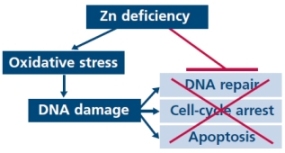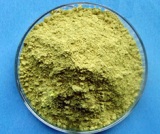Zinc is necessary for the production of testosterone and inhibiting the enzymatic activity of prostate specific antigen (PSA), a marker for the diagnosis and monitoring of prostate cancer. PSA is a protein produced by cells of the prostate gland. PSA is specific to the prostate and is not cancer-specific. Therefore elevated levels of PSA is seen in an array of condition such as prostatitis (inflammation of the prostate) and benign hypertrophy of the prostate (enlargement of the prostate) besides prostate cancer.
PSA could play a role in prostate cancer cell growth, migration and invasion. PSA is a serine protease with a molecular weight of approximately 33 kDa. The serine proteases are a family of enzymes that cut certain peptide bonds in other …
The roles of zinc in the body are numerous. Among other things, it serves to boost immune functions and plays a significant role in healing processes and the development of healthy bones. Lesser known, but equally essential roles include helping with the formation of hundreds of enzymes, and assisting with gene transcription and RNA and DNA metabolism. It’s found in the tissues of the brain, kidneys, muscles, liver and bones; however the highest concentration is found in the eye and the male prostate gland. Total zinc levels in the prostate are 10 times higher than in other soft tissues. It is known to be crucial to normal prostate function.
 Zinc is essential to protecting against oxidative stress and …
Zinc is essential to protecting against oxidative stress and …
 We now know that red palm oil contains the high concentration of palmitic acid (the saturated fatty acid). Palmitic acid is a well known cytotoxic agent against cancer cells. Saturated fats from animal and vegetable sources provide a concentrated source of energy in the diet; they also provide the building blocks for cell membranes and a variety of hormones and hormone like substances. They also enhance the immune system. At least with respect to cancer, plant-based sources of saturated fat are good for us. Palm oil, palm kernel oil and coconut oil are three of the few highly saturated vegetable fats. Of the tropical oils, coconut oil gets the most attention, while palm oil gets the mostly ignored….
We now know that red palm oil contains the high concentration of palmitic acid (the saturated fatty acid). Palmitic acid is a well known cytotoxic agent against cancer cells. Saturated fats from animal and vegetable sources provide a concentrated source of energy in the diet; they also provide the building blocks for cell membranes and a variety of hormones and hormone like substances. They also enhance the immune system. At least with respect to cancer, plant-based sources of saturated fat are good for us. Palm oil, palm kernel oil and coconut oil are three of the few highly saturated vegetable fats. Of the tropical oils, coconut oil gets the most attention, while palm oil gets the mostly ignored….
Prostate problems such as benign prostatic hyperplasia (BPH), prostatic intra-epithelial neoplasia (PIN), prostatitis and prostate cancer have been recognized as problems largely related to androgens (male sex hormones) and genetic factors. All men will develop prostate cancer if they live long enough. Prostate cancer is somewhat unusual, compared with other types of cancer. More than 95% of prostate cancers are adenocarcinomas, cancers that develop in glandular tissue. Male hormones such as testosterone are generally believed to be causatively associated with prostate cancer. We know that testosterone stimulates the prostate to grow. But, several recent studies show that a man’s susceptibility to prostate cancer may be influenced more by his exposure to the female hormone, estrogen, than to the male hormone, testosterone.
A small amount of estrogen (female sex hormone) is necessary …
One of the biggest misconceptions people have is that saturated fats increase the amount of bad cholesterol in blood. Cholesterol, however, forms part of the outer membrane that surrounds every cell. Cholesterol is used to insulate nerve fibres (and so make nerve signals travel properly) and make hormones, which carry chemical signals around the body. Without cholesterol, your body wouldn’t work – it’s vital to ensure the body’s normal function.
There are three main types:
Low-density lipoprotein (LDL): this carries cholesterol from the liver to the cells and, if supply exceeds demand, can cause harmful build-up of cholesterol
High-density lipoprotein (HDL): this takes cholesterol away from the cells and back to the liver, where it’s either broken down or excreted
Triglycerides: fats carried in the blood from the food we eat
Triglycerides and cholesterol are …
Adenosine is a naturally occurring purine nucleoside that forms from the breakdown of ATP (adenosine triphosphate). ATP is the primary energy source in cells for transport systems and many enzymes. Adenosine facilitates tumor survival by a variety of mechanisms. Adenosine can bind to purinergic receptors in different cell types where it can produce a number of different physiological actions. Adenosine accumulates in solid tumors and stimulates tumor growth and tumor angiogenesis while imparting tumor resistance to the immune system.
Extracellular adenosine initiates most of its effects through the activation of adenosine receptors. There are at least four subtypes of the adenosine receptor A1, A2A, A2B and A3 receptors. Adenosine receptors are all coupled to G-proteins and the A1 and A3 subtypes are associated with inhibitory G-proteins. Each of these four cell …
Chronic inflammation has been found to mediate a wide variety of diseases, including cancer, cardiovascular diseases, diabetes, arthritis, Alzheimer’s disease, pulmonary diseases, and autoimmune diseases. The arachidonic acid pathway constitutes one of the main mechanisms for the production of inflammation, as well as controlling homeostatic function. Arachidonic acid (AA) is an unsaturated fatty acid that the body uses to synthesize regulatory molecules such as prostaglandins (hormone like chemical messenger) and thromboxanes (involved in platelet aggregation and blood clotting). Arachidonic acid (AA) is a form Omega 6 fatty acid. Arachidonic acid (AA), gamma linolenic acid (GLA) and linoleic acid (LA) are three forms of Omega 6 fatty acids. Linoleic acid is converted to gamma-linolenic acid in the body and then further broken down to AA. Omega 6 fatty acid in the …
 Quercetin is one of the most ubiquitous flavonoids found in many fruits, vegetables, nuts, and red wine, and exerts anti-inflammatory and anti-carcinogenic activities. Research shows that quercetin may help to treat and prevent colon cancer. Quercetin can affect growth of colon cancer cells by both decreasing polyamine biosynthesis and inducing apoptosis. Polyamines are involved in cell growth and differentiation.
Quercetin is one of the most ubiquitous flavonoids found in many fruits, vegetables, nuts, and red wine, and exerts anti-inflammatory and anti-carcinogenic activities. Research shows that quercetin may help to treat and prevent colon cancer. Quercetin can affect growth of colon cancer cells by both decreasing polyamine biosynthesis and inducing apoptosis. Polyamines are involved in cell growth and differentiation.
The Wnt signaling pathway plays a pivotal role in cellular developmental processes and human carcinogenesis. Inhibition of expression of cyclin D(1) and survivin as well as the Wnt/beta-catenin, p21-RAS signaling pathway could be qualified as promising targets for innovative treatment strategies of colon cancer. Quercetin inhibits these pathways. Moreover, Quercetin activates AMPK (AMP-activated protein kinase), a physiological cellular energy sensor, through ROS …
Consumption of red and processed meat has been associated with an increased risk of colon cancer, a major cause of death in affluent countries. Scientists have offered a number of explanations for the link between red meat and colon cancer. One theory blames HCAs (heterocyclic amines), chemicals produced when meat is cooked at high temperatures. HCAs may play a role, but since high levels can also be present in cooked chicken, they are unlikely to be the whole explanation. In all cases the worry is confined to red meat, not chicken. Preservatives have also been implicated in the case of processed meats; nitrates are a particular worry, since the body converts them to nitrosamines, which are carcinogenic.
Epidemiological and experimental evidence supports the hypothesis that heme iron present in meat promotes …
We have already discussed the issues in other blogs about glutamine, and we already know that glutamine, converted to glutamate in the body, can stimulate growth of tumors.
Glutamine may actually stimulate growth of tumors.
High concentrations of oral glutamine also produce high amounts of glutamate in the blood, a breakdown product of glutamine. Glutamate is a key molecule in cellular metabolism and is the most common neurotransmitter in the brain. It is particularly abundant in the nervous system. The most common excitatory neurotransmitters are glutamate and aspartate while the primary inhibitory neurotransmitter is GABA. It is necessary for excitatory and inhibitory neurotransmitters to be in balance for proper brain function to occur. Glutamate receptors are responsible for the glutamate-mediated post-synaptic excitation of …